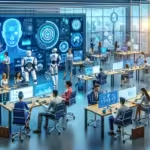The Transformative Role of Artificial Intelligence in the Modern Workplace
The rapid evolution of artificial intelligence (AI) is reshaping the modern workplace in numerous ways. As AI technologies continue to advance, they offer unprecedented opportunities for boosting productivity, enhancing decision-making, and driving innovation. However, this transformation also brings challenges and questions about the future of work, workforce dynamics, and ethical implications. In this blog post, we delve into the multifaceted impact of AI on the workplace and explore how businesses and employees can adapt to these changes.
AI: Catalyst for Enhanced Productivity
One of the primary ways AI is influencing the workplace is by enhancing productivity. Through the automation of routine tasks, AI systems free up human workers to focus on more complex and creative responsibilities. This shift can lead to substantial increases in efficiency and output.
Automation of Routine Tasks
AI technologies excel at automating mundane, repetitive tasks, such as:
- Data entry and processing
- Scheduling and calendar management
- Customer service via chatbots and virtual assistants
- Inventory and supply chain management
By handling these tasks, AI allows employees to allocate their time to strategic activities that require critical thinking and problem-solving skills, ultimately driving business growth and innovation.
Improved Decision-Making
AI’s capacity to process vast amounts of data at unprecedented speeds enhances decision-making processes. Organizations can leverage AI to analyze complex datasets, identify patterns and trends, and generate insights that inform business strategies. This capability enables companies to make more informed decisions, reduce risks, and adapt swiftly to changing market conditions.
AI’s Impact on Job Roles and Workforce Dynamics
AI is transforming job roles and impacting workforce dynamics in significant ways. While some fear job displacement, others believe that AI will create new roles and opportunities in the workplace.
Job Displacement Concerns
The fear that AI could lead to widespread job loss is not unfounded. Certain roles, especially those involving repetitive tasks, are more susceptible to automation. However, historical technological advancements have often resulted in more job creation than job loss, albeit with shifts in the types of roles available.
New Opportunities and Roles
AI’s integration into the workplace is also creating new roles and opportunities, such as:
- Data scientists and analysts
- AI and machine learning specialists
- Human-AI collaboration managers
- AI ethics and compliance officers
These roles focus on developing, implementing, and managing AI technologies, underscoring the need for a workforce skilled in AI-related disciplines.
Preparing for an AI-Driven Workplace
To thrive in an AI-driven workplace, organizations and employees must take proactive measures to adapt and upskill. This includes fostering a culture of continuous learning and innovation.
Focus on Upskilling and Reskilling
Employers must invest in upskilling and reskilling their workforce to equip employees with the skills required to work alongside AI technologies. This can be achieved through:
- Training programs and workshops
- Online courses and certifications
- Collaborative projects and experiential learning
By prioritizing education and skill development, organizations can ensure their employees remain relevant and competitive in an AI-enhanced workplace.
Fostering a Culture of Innovation
An AI-driven workplace requires a culture that encourages innovation and experimentation. Businesses should encourage employees to embrace AI technologies and explore novel applications that drive efficiency and creativity. Creating an environment where employees feel empowered to take risks and propose innovative solutions can lead to breakthroughs and competitive advantages.
Ethical Considerations in AI Implementation
The widespread adoption of AI in the workplace raises ethical considerations that must be addressed. Ensuring ethical AI implementation is crucial for maintaining trust and protecting stakeholders’ interests.
Data Privacy and Security
AI systems often rely on vast amounts of data, raising concerns about data privacy and security. Organizations must implement robust data protection measures and comply with relevant regulations to safeguard sensitive information and build trust with stakeholders.
Bias and Fairness in AI Systems
AI systems can inadvertently perpetuate biases present in the data they are trained on. Addressing bias and ensuring fairness in AI algorithms is essential to prevent discrimination and ensure equitable outcomes. Businesses must prioritize transparency and accountability in AI development and deployment processes.
Conclusion
The integration of AI in the workplace represents a transformative shift that carries both opportunities and challenges. By embracing AI technologies, businesses can enhance productivity, improve decision-making, and drive innovation. However, it is crucial to address the ethical and workforce-related implications to ensure a smooth transition to an AI-driven future.
Organizations and employees alike must remain agile and proactive, continuously adapting to leverage the benefits of AI while mitigating its potential drawbacks. With the right strategies in place, the future of work can be a collaborative synergy between humans and machines, leading to unprecedented advancements and opportunities.








